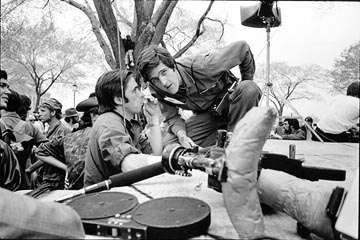
One the of criticisms of John Kerry's candidacy for President is that while he has been in the Senate for nearly twenty years, he talks about this minimally and instead talks about his experiences in Vietnam. To his supporters, these experiences demonstrate his leadership skills and are one of the reasons he should be elected President. Whichever side of the aisle one falls on, it is clear that John Kerry's experiences in Vietnam profoundly changed him and the way he looked at life. Although Going Upriver: The Long War of John Kerry is clearly on the side of Kerry, it is less about politics and more about history. This is a fairly non-partisan biography of a historical figure, similar to one that would air on PBS or any news channel.
Kerry had a middle class background, and his college friends at Yale remembered that he was always busy doing something. When the call came to enlist for the Vietnam War, Kerry felt that it was his duty to do so. The military needed educated able young men, and Kerry fit the bill. One of the more interesting things that director George Butler (Endurance, In the Blood) does is move pretty quickly over Kerry's time in Vietnam. It was clear that he demonstrated leadership among his men, and the people who served under him have the highest praise for their commanding officer. What is not in the film is the brouhaha erupting over the awarding of his medals. A group called the Swift Boat Veterans has challenged those medals, alleging that Kerry did not deserve them. But that is not the point of Going Upriver.
The real story begins when Kerry returned home. After seeing the horror of war in Vietnam, and the treatment of soldiers upon their return, Kerry began demonstrating against the war. Unlike many of the other demonstrators, he did not look anti-establishment. He was well spoken, had short hair, and a great education. In other words, he was somebody that Senators and Representatives could relate to. Because of this, he became the most visible person in the anti-war veteran's movement, enough so to testify in front of Congress, which gave him national exposure. Again, it is important to point out that regardless of what one thinks about Kerry's actions in protesting the war, it is easy to see that he was an effective leader in the movement. Vietnam changed him profoundly, and he was doing what he felt was the right thing to do.
Going Upriver was adapted by Joseph Dorman (Endurance) from Douglas Brinkley's novel. Butler and Dorman let Kerry slip into the background in the middle third of the film. This allows them to give the bigger picture. They present a lot of context and background, allowing people to understand Kerry's decisions. Kerry comes across as a man who follows his principles. He does what he feels is correct. And his speech in front of the Senate Foreign Relations Committee was electrifying. He is clear and eloquent in presenting his point of view. It's especially interesting, given that over time, apparently the stentorian traditions of the Senate have changed his delivery into what it is today.